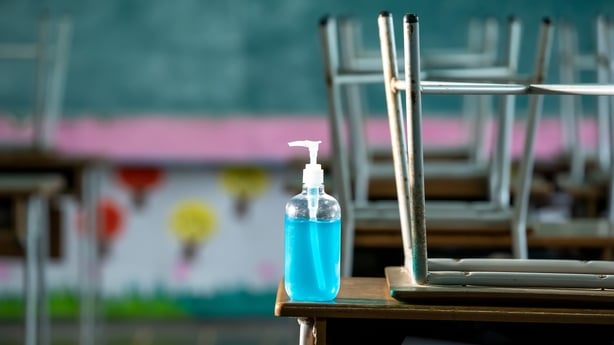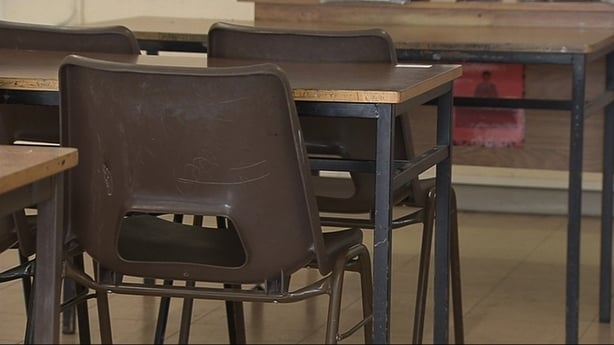The unrelenting and constant overassessment of students will result in widespread burnout, the Irish Second–Level Students' Union has told the Joint Oireachtas Committee on Education, Further and Higher Education, Research, Innovation and Science.
The committee heard from contributors about ensuring that schools are open during the Covid-19 pandemic in a manner that is both safe and sustainable.
ISSU president Reuban Murray said that students in exam years are having to sit monthly or even weekly tests with schools citing preparing for calculated grades as the reason.
Mr Murray said this is putting unnecessary and unsustainable amounts of anxiety on students.
He said there is not enough clarity on the 2021 State exams and that schools and students are underprepared to make a transition to online learning.
CEO of National Parents Council Primary, Áine Lynch, told the committee that parents are in the main very positive about the safety of schools for their children.
The NPC, which conducted a survey at the same time as it was announced that the country was going into Level 5 restrictions, found parents are mainly happy with the way schools have reopened and are happy with the communication between home and school.
Children also are reported by parents as being happy to be back at school, it found.
But the NPC said some parents are reporting dissatisfaction with adherence to regulations on school transport and difficulty in getting information and giving information to schools.
It said that whilst many parents reported being very happy with school transport, some parents were concerned regarding children sitting wherever they want to and not in the same place each day, a preference that all children should wear masks on such transport and that children from different schools were mixing on the same bus.

The NPC also said that many parents referenced that whilst they understand that outside of the school is somewhat outside of the schools remit they felt at risk dropping off and collecting their children due to parents congregating and not adhering to Covid-19 regulations regarding social distancing and wearing masks.
This issue was also raised by many parents who felt that their children regressed while schools were closed earlier this year, the survey found.
The NPC said that most parents reported they were very happy with the safety procedures inside the
classroom.
However, a number of parents raised concerns that some teachers were wearing visors rather than masks and questioned the safety of this practice.
The survey also highlighted concerns regarding lack of permission for children to socialise and talk to friends at break times with other children in their pod/classes.
The NPC said a small number of parents raised concerns regarding strict regulations for socialising in the school yard - in some instances meaning that children who were in the same pod in the class were not permitted to play together in the yard due to a policy at breaktime regarding social distancing for all children.
Ventilation was raised by parents in two areas in the NPC survey.
Some were concerned that the classrooms were not being ventilated appropriately whilst other parents were concerned regarding ventilation and cold classrooms making it uncomfortable for children and making it difficult for them to concentrate and learn.
Another survey from the National Parents Council Post Primary (NPCPP) of parents shows that when schools reopened almost 50% of returning students reported anxiety and, as of now, 60% of 5,000 respondents report that the anxiety then felt has not abated and that for 20% their level of anxiety has increased.
Fear of the spread of infection within schools and the risk of bringing the disease home remain a significant concern amongst parents and students, NPCPP CEO Mai Fanning told the committee.
The organisation said there is also concern that parents are not being fully informed when an incidence of Covid-19 occurs in school.
Both Ms Lynch and Ms Fanning said they would not be in favour of a longer Christmas break as students have missed out on enough classroom time already.

In a submission to the committee in advance of its appearance, second level student's union ISSU said "genuine and constructive" communication must take place between local student representatives or councils and school managers in relation to school guidelines and rules on safety.
It also called on the Department of Education to ensure that the views of students are included when department inspectors liaise with schools to evaluate their implementation of Covid-19 guidelines.
It said there is "serious confusion, anxiety and frustration" among students as to why schools are being treated differently to other sectors of the community.
It referred to the fact that schools remain fully open, while unable to fully adapt to public health responses in areas such as physical distancing and transport.
The submission said: "With a lot of schools overcrowded before the pandemic, small classroom sizes and the exponential growth of cases in the community, there is increased concern around the ability to sustain schooling under these conditions whilst avoiding increased transmission".
ISSU said that vulnerable students, or students who live with vulnerable people, should not be required to physically attend school, and should have access to comprehensive online tuition instead.
Additional reporting Emma O'Kelly







